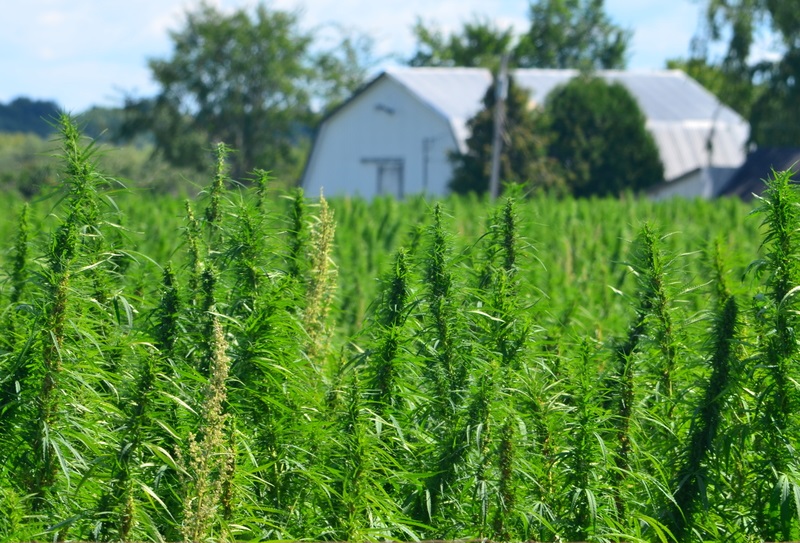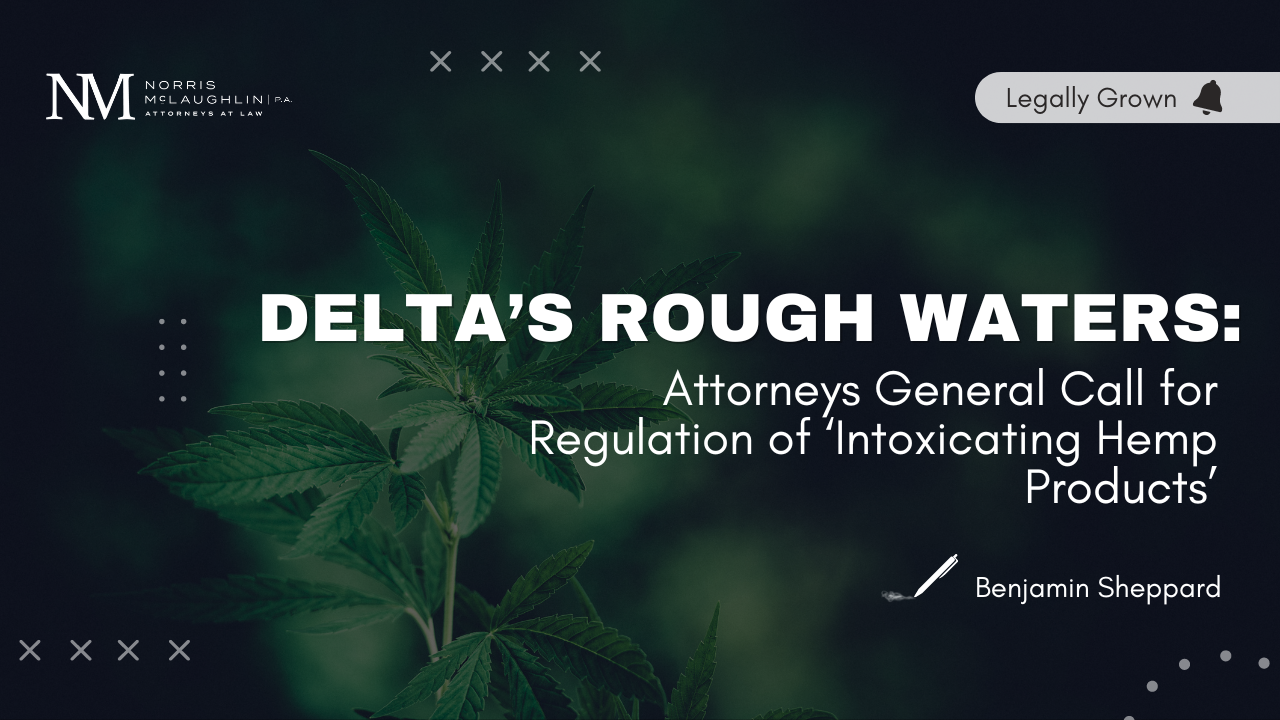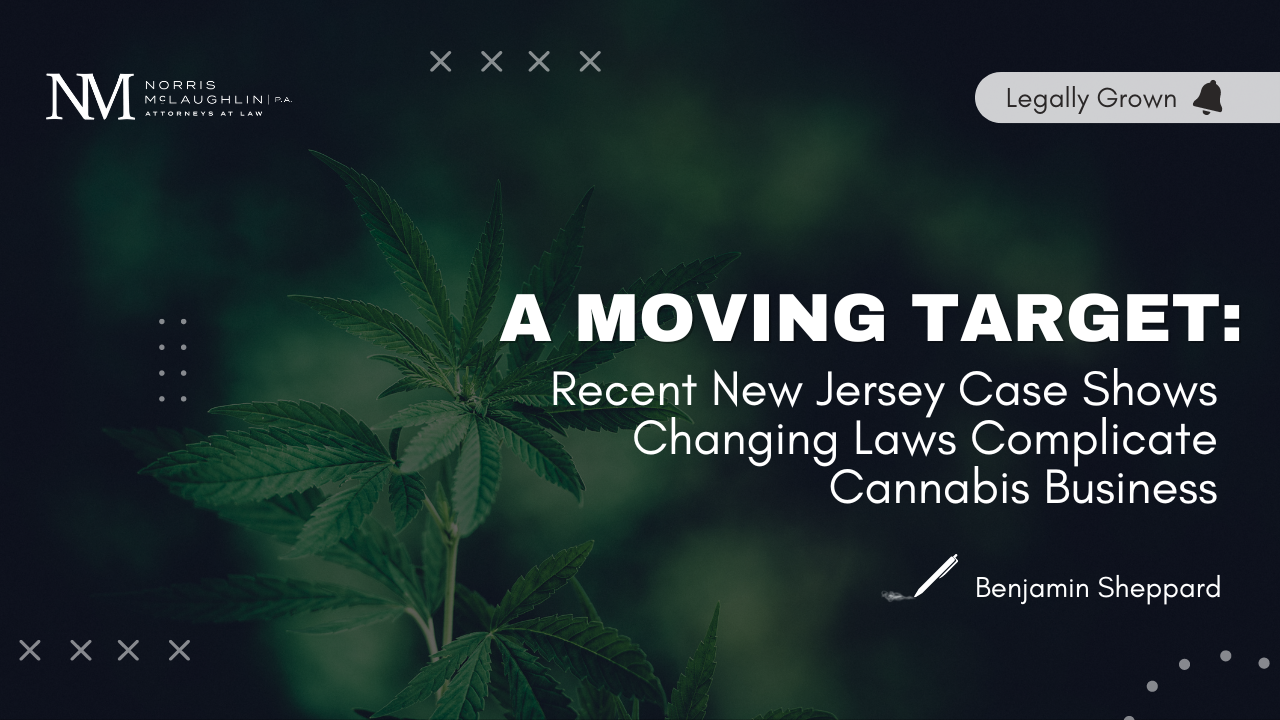Industrial Hemp Farmers in Need of Federal Crop Insurance

Cannabis businesses are not immune to the harsh realities of any other business. In fact, they likely deal with even more difficult challenges than more traditional businesses. For example, most businesses—if not all—should have some form of insurance and, without insurance, a business’s only remedy may be to resort to and/or be subject to the court system. Unfortunately for cannabis businesses, federally subsidized crop insurance is simply unavailable at this time, even for industrial hemp.
Background
Although the Agriculture Improvement Act of 2018, signed into law on December 20, 2018 (the “2018 Farm Bill”), declassified industrial hemp (and its derivatives containing less than 0.3% THC) as a Schedule 1 controlled substance under the federal Controlled Substances Act, the 2018 Farm Bill provided no mechanism for obtaining crop insurance for industrial hemp. To this day, hemp farmers are still unable to obtain federal crop insurance for their product. In light of this problem, Congress recently began the process to extend crop insurance protections through the recently signed 2019 Disaster Aid Bill. As part of that legislation, hemp cultivators should be able to obtain federal crop insurance beginning in 2020.
Hemp is seen as a new opportunity for farmers and businesses that are interested in diversifying their crops or seeking new or more profitable endeavors. The cultivation of hemp will create more jobs in the farming industry, and the production of hemp products, including products from hemp derivatives such as CBD, is anticipated to be in high demand. The entire hemp and CBD industry, however, hinges on the success of the hemp farmers.
With the enactment of the 2018 Farm Bill, hemp growing is restricted as per the United States Department of Agriculture’s (USDA) memorandum dated May 28, 2019. The USDA memorandum reflects that the states may not prohibit the interstate transportation or shipment of hemp lawfully produced under a state or travel plan, or under a license issued under the USDA plan. Moreover, states and tribes cannot prohibit interstate transportation or shipment of hemp lawfully produced under the 2014 Farm Bill.
Additionally, under the 2018 Farm Bill and the USDA memorandum, a person with a state or federal felony conviction related to controlled substances is subject to a 10-year ineligibility restriction on producing hemp under the Agricultural Marketing Act of 1946. An exception applies to a person who was lawfully growing hemp under the 2014 Farm Bill before December 2018, and whose conviction also occurred before that date. The memorandum further states that the USDA anticipates issuing regulations implementing the new hemp production authorities sometime in 2019.
As we recently blogged, New Jersey just recently passed the Hemp Farming Act, which will allow farming of industrial hemp once the New Jersey Department of Agriculture gets its soon-to-be promulgated rules and regulations approved by the USDA.
The current lack of federally subsidized crop insurance, however, leaves hemp cultivators with little recourse when their crops go south. In general, farmers of traditional crops such as corn, potatoes, tomatoes, etc., can obtain coverage for damaged or low-yield crops through federally subsidized “Multiple Peril Crop Insurance,” which protects crop yields from natural causes including drought, excessive moisture, freezing, and disease. Depending on the language of the policy, a farmer may be able to safeguard himself/herself from not only natural causes affecting crop yields but also theft and potential loss in revenue due to changes in market price. Such federally subsidized insurance is not available for hemp.
As a result of the uncertainties and lack of regulatory guidance concerning hemp cultivation, several lawsuits have been filed by private parties regarding crop loss. In addition to the Idaho litigation involving the seizure of nearly 7,000 pounds of hemp, three recent multi-million-dollar hemp litigations of note are making their way through the courts. Although it is currently unknown whether the farms involved in these cases actually had crop insurance, they probably did not, given the current regulatory landscape and the direct resort to the courts. Assuming that no crop insurance was in place, court was the only remedy for the parties involved in the cases below.
Examples of Litigation Cases
First, in May 2019, Big Bush Farms (“Big Bush”) filed a lawsuit in Oregon state court against the defendants for breach of contract, conversion, and unjust enrichment, relating to a hemp cultivation contract that allegedly went awry. Big Bush alleged that it entered into a contract with the defendants whereby it taught the defendants “best hemp farming practices” and supplied it with hemp seeds. The defendants allegedly agreed to plant, grow, and harvest a total of 27,000 plants for Big Bush and Big Bush would pay $25/lb. for the hemp harvested, plus a bonus of $1/lb. for every 2% CBD oil content over 10%. Big Bush alleged that the defendants harvested a whopping total of 108,000 lbs. of dried biomass that tested at 14.5% CBD oil content for a total of $27.25/lb. under the contract, but defendants refused to sell any more than 14,582 lbs. back to Big Bush. Big Bush is now suing the defendants for over $267,000,000 for failure to sell Big Bush the remaining 103,747 lbs. Big Bush has reportedly filed similar lawsuits against two other farms, alleging similar conduct but seeking lesser damages.
Second, another recently-filed lawsuit in Oregon involves a plaintiff seeking to recover $57 million from the defendants over an alleged breach of an agricultural production contract. Under the contract, the defendant reportedly agreed to plant, grow, dry, and harvest 13 acres of hemp at 1450 plants per acre, for a total of 19,000 plants. The plaintiff agreed to pay all actual costs associated with the crop, which plaintiff would then sell, be reimbursed for expenses, with the remaining balance sold at a particular price per pound divvied up between the plaintiff and defendant. The plaintiff argued that the defendant refused to handpick the crop and failed to meet certain parameters of providing CBD oil content, and allowed the plaintiff only half of the 217,227 pounds of the crop. The plaintiff alleged that the first two actions reduced the value of the crop, which amounted to theft, resulting in tens of millions of dollars in damages.
In the third recent lawsuit, Canopy Growth USA LLC (“Canopy Growth”) filed a complaint in the United States District Court for the District of Northern California alleging that the defendant, Research and Development Farming, LLC, breached a contract to grow hemp seedlings for Canopy Growth. Canopy Growth allegedly provided the defendant with nearly $1.7 million upfront for costs and materials needed to grow 55,000 hemp seedlings provided by Canopy Growth. The defendant allegedly misused or misappropriated nearly $1,000,000 of the initial $1.7 million and had destroyed approximately 40% of the hemp seedlings due to poor farming practices. Under the contract, the parties intended that the defendant supply Canopy Growth with the hemp crops for the 2019 season. Canopy Growth sued when it learned that the defendant would not be able to meet the terms of the contract and had allegedly misappropriated funds.
Conclusion
Clearly, we are seeing production lawsuits increase as the demand for hemp (especially CBD products) increases. Production lawsuits like these would be backstopped by crop insurance in the ordinary course of farming. However, even with the December 2018 declassification/decriminalization of hemp, federal crop insurance is still not available. Although the private market for crop insurance is offering policies for hemp crops grown indoors and in greenhouses, the marketplace has not offered policies for outdoor hemp crops. Thus, hemp farmers need to prepare their contracts very carefully to provide protections in terms of which party is covering the cost of production and where and when laboratory testing is going to be performed. Moreover, best farming practices have not yet been standardized for hemp due to the recent decriminalization. Hence, the need for federal crop insurance is critical.
If you have questions about this or any cannabis-related topic, please feel free to contact us at wjbeneduce@norris-law.com or ealvarez@norris-law.com.



